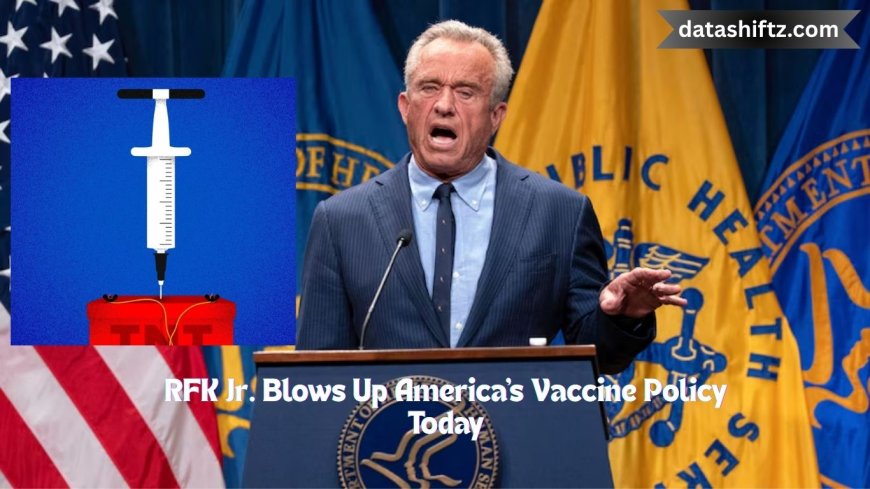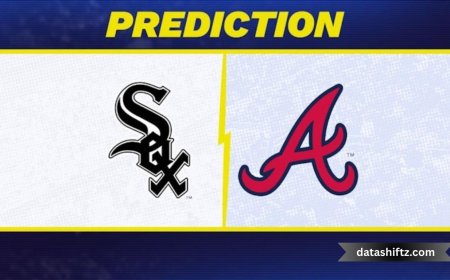RFK Jr. Blows Up America's Vaccine Policy Today

Robert F. Kennedy Jr., independent presidential candidate and longtime vaccine skeptic, made headlines today after delivering a fiery and controversial critique of America’s vaccine policy. Speaking at a nationally televised press conference in Washington, D.C., RFK Jr. accused federal agencies of corruption, pharmaceutical companies of manipulation, and current vaccine policies of infringing on personal freedoms. His comments have reignited a fierce national debate about vaccine safety, public health policy, and the role of government in healthcare decisions.
A Challenge to the Establishment
Kennedy, a known critic of the pharmaceutical industry, did not hold back during his address. He alleged that the Centers for Disease Control and Prevention (CDC), the Food and Drug Administration (FDA), and the National Institutes of Health (NIH) are “captured agencies” influenced by the pharmaceutical lobby. According to RFK Jr., this relationship undermines public trust and distorts scientific research in favor of corporate profits.
“The American people deserve transparency,” Kennedy declared. “We’ve traded public health for private wealth, and the results are devastating.”
He cited rising rates of chronic illness among children, vaccine injury claims, and a lack of long-term safety studies as symptoms of a deeply flawed system.
Reactions from the Medical Community
The medical establishment was quick to respond. Prominent doctors and researchers condemned Kennedy’s remarks, warning that they could lead to increased vaccine hesitancy and outbreaks of preventable diseases.
Responses from Key Institutions
| Institution | Response Summary |
|---|---|
| CDC | Reaffirmed vaccines are safe and essential |
| AMA (American Medical Association) | Called Kennedy’s comments “dangerous and misleading” |
| NIH | Emphasized reliance on peer-reviewed, evidence-based science |
| Johns Hopkins University | Expressed concern about misinformation eroding public trust |
Health professionals emphasized that vaccine safety is rigorously monitored and continuously reviewed. “Vaccines save lives. The data is clear,” said Dr. Maria Jennings, an infectious disease specialist. “While no medical intervention is without risk, the benefits of vaccines overwhelmingly outweigh the dangers.”
RFK Jr.'s Vaccine Criticisms: Key Points
Kennedy’s criticisms are not new, but they have taken on renewed significance given his bid for the presidency. Below are the main issues he raised:
RFK Jr.’s Main Allegations
-
Federal agencies are financially tied to pharmaceutical companies.
-
Vaccine manufacturers are shielded from liability under the 1986 National Childhood Vaccine Injury Act.
-
The number of recommended vaccines for children has increased significantly without adequate testing.
-
Public health mandates infringe on constitutional liberties.
-
The media fails to critically investigate vaccine-related risks.
These arguments have been widely debunked by scientists, yet Kennedy’s message continues to resonate with a segment of the population that is skeptical of both government and corporate interests.
A Polarizing Impact on the 2024 Election
Kennedy’s statements today are likely to deepen political divisions as the 2024 election heats up. He appeals to voters across the political spectrum, including libertarians, independents, and some on the far left and right who are wary of government overreach.
Numbered List: Potential Political Consequences
-
Increased Support from Anti-Establishment Voters: Kennedy’s messaging may pull voters from both Trump and Biden.
-
Public Health Setbacks: Increased vaccine skepticism could lead to declining immunization rates.
-
Media Attention: The controversy ensures sustained media coverage, boosting RFK Jr.'s visibility.
-
Policy Shifts: May pressure other candidates to clarify or revise their public health stances.
Conclusion: A Tipping Point in the Vaccine Debate?
RFK Jr.’s press conference marks a pivotal moment in the national conversation about vaccines. Whether you see him as a truth-teller challenging corrupt systems or a dangerous spreader of misinformation, there is no denying the impact of his words. As the election draws near, his voice will remain a disruptive force—one that could shift both political dynamics and public health conversations.
In the end, Americans must decide what kind of healthcare future they want: one steered by scientific consensus and institutional trust, or one shaped by populist skepticism and radical reform. Either way, today’s speech by RFK Jr. ensures the vaccine debate is far from over.





























